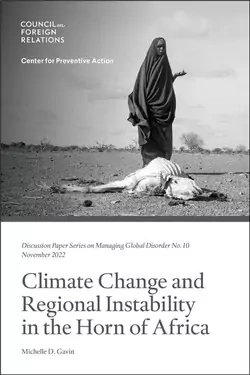
Climate Change and Regional Instability in the Horn of Africa

Climate change is exacerbating instability in the Horn of Africa. Democratizing climate awareness, respecting African energy needs, and supporting regional organizations are strategies to mitigate its effects.
- Report
Climate change and climate-induced migration in the Horn of Africa could seriously exacerbate security risks in the region. The sixth assessment report of the Intergovernmental Panel on Climate Change reiterates the grim facts of climate change in Africa. The continent has contributed little (less than 4 percent) to total greenhouse gas emissions but has already suffered serious consequences, from biodiversity loss to reduced food production. In East Africa particularly, drought frequency has doubled. Yet, between 2010 and 2018, most Horn countries received less than the average amount of climate adaptation funding per capita for lower-income countries, despite ranking at the top of climate vulnerability indices. Not only is financing for adaptation measures insufficient, but climate research in the region is also under-resourced.
The Horn of Africa is extremely vulnerable to climate change, as it encompasses vast drylands, numerous pastoralist communities, multiple border disputes, unresolved trans-boundary water-rights issues, and porous land borders. The region also has a traumatic and politically contentious history with natural disaster, famine, and conflict, including the 1983–85 Ethiopian famine and the controversial 1992–93 humanitarian intervention in Somalia. In fact, the impetus for forming the Intergovernmental Authority on Development in 1986 was to address drought and desertification from a regional perspective, with peace and security issues added to the organization’s mandate in 1996 due to the obvious interconnection of those issues. The Horn’s history informs and sometimes politically distorts perceptions of current climate-related threats.
More on:
Ongoing conflicts in the region add complexity to any effort to envision future scenarios. The Horn is not just at risk for conflict and instability—conflict and instability are its current reality. In Ethiopia, Somalia, South Sudan, and Sudan, multiple ongoing conflicts involve violent clashes between military and militia forces. The region already hosts nearly 2.9 million refugees and asylum seekers and over 12 million internally displaced persons. The Horn is currently the site of one of the world’s worst food insecurity crises; in August of 2022 the number of highly food-insecure people in Ethiopia, Kenya, and Somalia reached twenty-two million, and some already face famine conditions. Although conflict and crisis prevention is at the heart of efforts to identify interconnected climate and migration risks, for many in the region, the present is already characterized by insecurity, and the future by uncertainty.
Demographic, economic, political, and environmental pressures all intersect in the Horn of Africa, driving popular unrest and resource competition and destabilizing migration patterns that exacerbate tensions within and between states. Regional disorder will have implications far beyond the Horn, affecting the politics, security, and relative power of external actors and constraining the prospects for effective global governance. The United States and others should act now to mitigate those risks.
This is the tenth Discussion Paper in the Managing Global Disorder series, which explores how to promote a stable and mutually beneficial relationship among the major powers that can in turn provide the essential foundation for greater cooperation on pressing global and regional challenges.
This Discussion Paper was made possible by a grant from the Carnegie Corporation of New York. The statements made and views expressed are solely the responsibility of the author.
Professors: To request an exam copy, contact [email protected]. Please include your university and course name.
More on:
 Online Store
Online Store